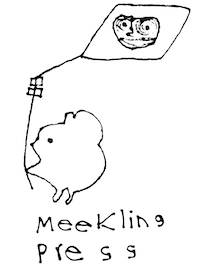Regarding Sylvia Jones and her auspicious debut collection Television Fathers, I along with Meekling Press nominate her for president of the poetic realm. Not only because we deserve a woman president!, and it’s not because these poems strive to be political, but instead because Jones writes of the pitfalls of late capitalism, and lays bare the realities of Blackness in America, on television, in film, like no one’s quite said it before. She does this while delighting in the beauty, ennui, & ecstasy of loving and writing among a long lineage of artists and poets. She pairs desperation with legerdemain and linguistic play. It’s a tall order, this office, but Sylvia has more than enough the talent for the task. Perhaps Ashleigh Bryant Phillips says it best by calling Television Fathers “a transmission for our end times, a prophecy priced out of the zeitgeist” and one that “only Sylvia Jones can/will say.”
I sent Sylvia some questions with guidance that she was welcome to keep her responses brief. Her responses are pithy and smart, as expected, and we’re lucky that her list of influences is long, and lays bare only a fraction of the influences for the poems collected in Television Fathers.
If you’re in Baltimore, we implore you to attend the ‘official’ launch party at Greedy Reads Remington — tomorrow, November 14 at 7PM .

This exhaustive list is the exact opposite of the brevity you requested, but as you’ve probably gleaned from the pathos of the manuscript, I can get a little carried away with my affinity for pop culture.
Nevertheless, if there was only one item to highlight on this list, it would be Glenn Ligon’s video installation exhibit “We Need To Wake Up Cause That’s What Time It Is”, which features a silent seven-channel video installation based on the infamous 1982 film, Richard Pryor: Live on the Sunset Strip. Ligon removes Pryor’s voice, and thereby, the incisive comedy for which he is best known.
Much of Ligon’s practice explores the limits of language, particularly as it relates to history and identity and that’s the exact energy I believe Television Fathers leads with.
Who are your television fathers? What are the filmic / TV influences in this book?
- Cleo, from Set It Off (played by Queen Latifah)
- Omar Little from The Wire (played by Michael K Williams)
- Frank from Homicide: Life on the streets (played by Andre Braugher)
- Don Draper from Mad Men (played by John Hamm)
- John Prentice from Guess Who’s Coming to Dinner (played by Sidney Poitier)
- Imitation of Life (1921)
- Trading Places (1985)
- Last King of Scotland (2006)
- Good Times (1972-1979)
- Jean Genet
- Lorraine Hansberry
- Marlon Riggs
- Bina48, an African-American robot
There are a number of ekphrastic poems in the collection — what image(s) / artist(s) have most influenced your work?
Noah Davis’ painting Man with Alien and Shotgun inspired the opening poem of the collection. It’s one of those subverted portraiture paintings that startle the viewer, like Hans Holbein the Younger‘s Dead Christ startled Dostoevsky. If anything, the poem is an appetizer / gateway drug to the painting.
Do you have a writing routine? How do you go about composing your poems?
I write poems like people who hoard to go to yard sales. It’s constant and definitely contributes to my time-blindness. I can definitely revise something to the bone. I can also carry a piece for a long time until it finds its place.
Where do you write?
I usually write standing up. I have a thread in my phone like most word-hawkers but I also buy a lot of notebooks and write in them and throw them into my desk, thus losing them to the ever growing pile of shit I write down and lose forever. Technically, I write everywhere.
Do you find Baltimore to be a muse?
I want the poems to reflect my environment in a rarefied way. Not all of them are from Baltimore, or about urban spaces. Sometimes, like for instance in “Because I Didn’t Have a Shopping Cart”, they’re about my relationship to customer service spaces.
There’s a cento that didn’t make it into the final manuscript called “Stringer Bell and Omar Little at the Meyerhoff”. It’s a compilation of epigraphs from episodes of The Wire—I wrote it as an elegy to Micheal K Williams, who was the first black gay person on tv I ever saw. I’m flirting with the past through semantic evacuation, hoping readers will join me in renegotiating their own notions of spatial limits and how they shape our material lives.
Baltimore is such a red ball, it catches a lot of slack, but living here in the city has been its own canonical glory for me.
p.s. a follow-up list of influences & ‘fathers’:
- Giancarlo Esposito, School Daze
- Lily Taylor, I Shot Andy Warhol
- Jane Fonda, They don’t shoot horse do they?
- Jennifer Beals, Last Days of Disco
- Al Pacino, Cruising
- Cheryl Dunye, Watermelon Woman
- Dustin Hoffman, Midnight Cowboy
+++ see also:
- Jon Voigt in Midnight Cowboy (1969)
- Jodie Foster in Silence of the Lambs (1991)
- Morgan Freeman in The Bonfire of the Vanities (1990)
- Jenny Shimizu in Foxfire (1996)
- Danny DeVito in Tin Men (1987)
- John Tuturro in Millers Crossing (1990)
- Joe Pesci in Raging Bull (1980)




Leave a Reply